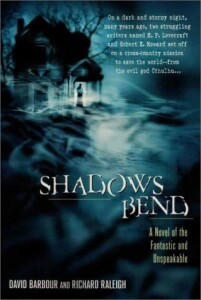 Imagine, if you will, Conan the Barbarian taking on Cthulhu and its inhuman minions, with the fate of the world at stake. Quite an image, isn’t it? Admittedly, it does sound like something you’d find in a straight-to-video movie, or some obscure animated feature. But if you’re a fan of either Conan or Cthulhu, it also sounds like a heck of a lot of fun.
Imagine, if you will, Conan the Barbarian taking on Cthulhu and its inhuman minions, with the fate of the world at stake. Quite an image, isn’t it? Admittedly, it does sound like something you’d find in a straight-to-video movie, or some obscure animated feature. But if you’re a fan of either Conan or Cthulhu, it also sounds like a heck of a lot of fun.
With that premise in mind, we’re given Shadows Bend, a “what if?” tale of terror, written by David Barbour and Richard Raleigh. These two are not content to merely hinge their novel on a singular conceit: what if Howard Phillips Lovecraft and Robert E. Howard, creators of Cthulhu and Conan, respectively, actually met face to face? They up the ante by then asking, what if Cthulhu, Nylarthotep and the other Elder Gods were not simply figments of Lovecraft’s Stygian imagination, but truthfully part of a very dark reality which Lovecraft was fortunate (!) enough to glimpse.
“What if,” indeed. In reality, though correspondents for many years, Lovecraft and Howard never managed to actually meet. And we can only hope the Elder Gods exist only on paper (cute stuffed Cthulhu dolls notwithstanding). But what a fantastic premise for fans of the pulp genre.
And what a fantastic book, as a result. The novel opens with Lovecraft traveling to Texas to seek Howard’s counsel, because he has come into possession of an artifact he thinks is related to his Cthulhu mythos. Because of their correspondence, Lovecraft believes Howard might not think he’s gone crazy. Though he remains dubious, the strange events that accompany Lovecraft’s arrival convince Howard to leave his ailing mother for a trip to fellow correspondent and pulp author, Clark Ashton Smith, who has somehow come into possession of an apparently authentic version of Lovecraft’s fictional Necronomicon, or Book of the Dead. Lovecraft hopes Smith’s book holds the key to the artifact’s purpose.
Thus begins our heroes’ journey. Striking out cross-country to Smith’s California home in Howard’s Chevy, the two men soon realize they’re being followed by the “dark men,” who doggedly haunt their every step. Along the way, they pick up a prostitute, Glory McKenna, who is more than she seems, and encounter an Indian shaman who explains the awful truth behind the Elder Gods, and the role these three (H. P., Howard, and Glory) will play in preventing Cthulhu’s emergence into this world.
The journey is not an easy one for H. P., Howard and Glory. Beset not only by Cthulhu’s minions, they must also overcome their own personal conflicts. Howard, ever the macho Texan (or Texian, as he is fond of saying), is both attracted to and repulsed by Glory. Glory, in turn, is appalled by the men’s racism (against Indians) and displeased at having been pulled into something horrifying, of which she wants no part. Lovecraft is a fish out of water, a refined, eccentric, physically weak man thrust into an action-adventure scenario. He stands out like a sore thumb. All three have their ghosts to deal with: H. P. is haunted by his stories, Howard by his dying mother, and Glory by her dead son.
The dynamic among the three is very engaging (even more so for the brief time when Clark Ashton Smith is thrown into the mix), and a joy to watch, even as they spiral downward toward the inevitable encounter. While I have read little biographical information on any of the three writers, the characterizations seem to ring true to their fictional creations, if not to their actual natures. Overall, the book reads like a juiced-up version of a Lovecraft story, full of creeping horror, interlaced with bursts of larger-than-life action.
The book’s climactic struggle, taking place in the New Mexico location Shadows Bend (hence the title), is somewhat confusing, but I didn’t much mind, as I’ve always found Lovecraft’s own work similarly obtuse yet enjoyable. The epilogue very neatly ties the fictional events of this book to the very real deaths of its two main protagonists. A nice touch.
Barbour and Raleigh have written a terrific book for fans of the pulp genre, and of Lovecraft and Howard, in particular. It’s a fast-paced, delightful read I can’t recommend enough.
(Ace, 2000)
